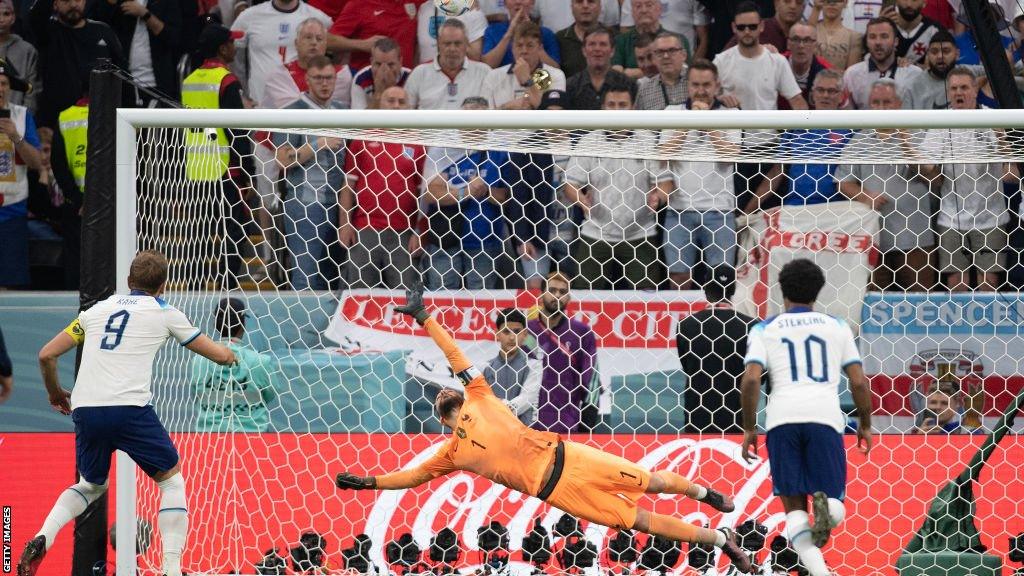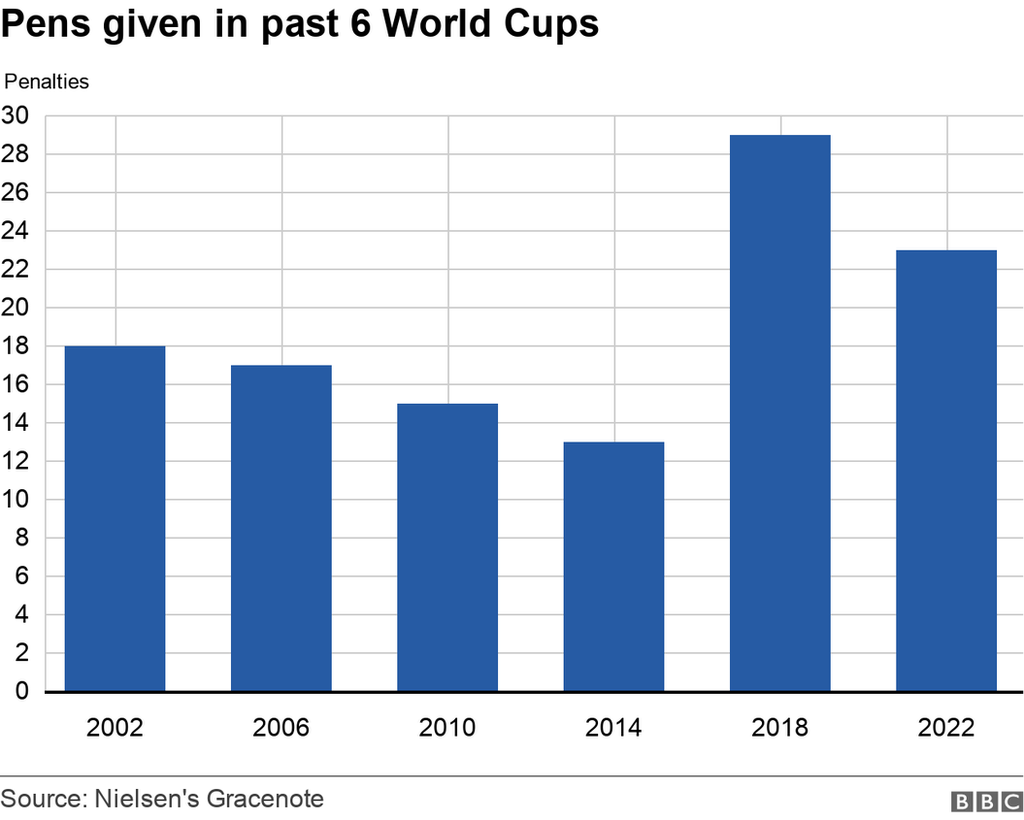World Cup 2022: Five trends from Qatar - upsets, injury time & penalties
- Published

Lionel Messi, 35, was one of a record 23 'veteran' players (aged 35 or over) to make a combined total of 83 starts - a World Cup record
After 64 games and a record 172 goals, Argentina were crowned World champions for a third time with their dramatic penalty shoot-out victory over France.
Data analysts Nielsen's Gracenote examined the trends from the 2022 competition after the conclusion of the first World Cup to be held in the winter, and in the Middle East.
1. Most upsets for 64 years
Qatar was a tournament for the underdogs with 15 matches ending in an upset.
That started with Saudi Arabia's 2-1 win over eventual winners Argentina on the third day of the tournament - one of 12 shocks in the group stages, which is a record for the competition.
Morocco's eliminations of both Spain and Portugal in the last-16 and quarter-finals respectively, and Croatia's quarter-final win over Brazil, meant 24% of games ended in what Nielsen's Gracenote classes as an upset.
That is the highest percentage of shocks since Sweden 1958 (26%).
According to Nielsen's Gracenote's methodology, an upset occurs if "the winning team had less than 33.3% chance of winning over 90 minutes in the group phase or a maximum of 47% chance of eliminating their opponents in the knockout phase."
Number of upsets | Year | Percentage of matches ending in upset |
|---|---|---|
15 | 2022 | 24% |
14 | 2002 | 22% |
12 | 2010 | 19% |
12 | 2018 | 19% |
11 | 1990 | 17% |
11 | 1994 | 17% |
10 | 1986 | 16% |
9 | 1958 | 26% |
8 | 1982 | 16% |
8 | 2006 | 13% |
2. Fewer shots...more goals
There were 'only' 1,458 shots at this year's tournament, which was the lowest since Nielsen's Gracenote started recording data on the statistic in 2002, down from a high of 1661 in 2014.
Indeed, the average number of shots taken during a match in Qatar was 22.8.
But that did not stop the goals raining in, with a record 172 goals scored - the highest since the tournament was expanded to 32 teams in 1998, with 171 scored at both France 1998 and Brazil 2014.
Only USA 1994's 2.71 goals per match beats Qatar 2022's 2.69.
There were 117 different goalscorers in the tournament - five shy of the World Cup set in Russia four years ago.
More goals were also scored from inside the penalty area than any of the four previous competitions at which data was collected on the statistic.
92.9% of goals were scored from inside the penalty area, with a record 62.7% of shots inside the box.

England captain Harry Kane scored one penalty and missed another against France in the quarter-final
3. 'Cleanest' World Cup this century and more stoppage time
Referees handed out 227 yellow cards - the most since 2010, which Nielsen's Gracenote say is down to stricter refereeing, while only four red cards were shown - the same as in Russia.
But the number of fouls declined for the fourth successive tournament to its lowest level this century at 1,599 - perhaps a reflection of referees being encouraged to let play flow.
A total of 23 penalties were awarded at an average of 0.36 per match - including three in the final - but that was actually down on the 2018 World Cup in Russia, the first with Video Assistant Referee (VAR) technology.
The amount of stoppage time was a big talking point earlier in the tournament and matches lasted an average 11 additional minutes - up from six minutes in 2018 - due to Fifa's stricter rules on time-wasting.

The three penalties in the World Cup final contributed to a total of 23 in the tournament - not including shoot-outs
4. Young guns
The 2022 competition saw the most teenagers starting than at any other World Cup.
10 teenagers made 20 starts including 19-year-old England midfielder Jude Bellingham, 19-year-old Germany midfielder Jamal Musiala and 18-year-old Spain midfielder Gavi.
France forward Kylian Mbappe, now 23, still holds the record for most starts as a teenager with six to his name at the 2018 edition.
5. Ageing stars
It was not just a year for the young players as it also saw the most veteran players, competitors aged 35 and over, starting World Cup matches.
A combined 27 veteran players made 83 starts at the 2022 tournament, 32 more starts than the previous record set at the 2002 World Cup.
Messi, 35, and Croatia's Luka Modric, 37, made the most starts of any veteran player in Qatar with seven each.

Get the latest results and goal notifications for any team at the Fifa World Cup by downloading the BBC Sport app: Apple, external - Android, external - Amazon, external


Get your daily dose of Fifa World Cup reaction, debate & analysis with World Cup Daily on BBC Sounds
